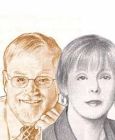Career
Passing Along Work Ethic to Children:
What Families of Wealth Can Teach Us.
Posted November 23, 2012
Most of our leadership development/career management work is paid for by corporations. One type of corporation we work for is called the family office.
A family office is a private company that manages the investments and trusts for one family. Traditional family offices also provide personal services such as helping the family to focus on a philanthropic mission, arranging family reunions, providing career services to family members, investment education for the young, managing household staff and making travel arrangements. For the dedicated family office, the family's net worth often exceeds $100 million. Families with net worth between $3 and 100 million can find services through multi family family offices. These services are sometimes run as units of banks, accounting firms, and law firms.
We have been retained by family offices to work on career-related issues for parents and young adults in such families. As a psychologist, I have been intrigued by the issue that some parents in first generation families of wealth seem to effortlessly pass on the work ethic to the next generation. But most families pass on wealth without passing on the work ethic. “From Shirtsleeves to Shirtsleeves in Three Generations” is a cliché used in the family office industry to how difficult it is to pass on the behavioral habits of success.
Three family offices allowed us to interview families where the work ethic had been passed and five families where it was believed families had failed to pass on the work ethic to children. Each family was told that I was engaged in a general study about how parents manage the dilemma of dealing with discussions of money in front of children.
These ten families who allowed do not represent a complete sample of the family of wealth population. But they do represent a starting point for more rigorous research.
Key issues to be discussed include: Key issues include (1) the role of automobile time as a vehicle of socialization and (2) be wary about outsourcing opportunities to demonstrate conscientiousness to your children.
Leo’s Four Children
The following story illustrates our findings about the role of the automobile:
Leo’s father was a policeman in New York but he managed to get a scholarship to Massachusetts Institute of Technology. After graduation and work with a well known software company, went out to create his own software company.
During the early days of his company, there was a constant time-money struggle between the demands of a growing business and the demands of a growing family. Every weekday morning, Leo would get up early to make son Allen and daughter Betty their morning breakfast. He would also prepare their lunch and pack it. Leo would drive them to school.
Drive time was the only time Leo had the opportunity to speak with his children and he kept the radio off. He would not allow them to listen to music on their headphones. He would ask about their upcoming day. And he would tell them about his day, including his frustrations and anger. Sometimes he would give reports about success. And sometimes he would give reports about failure. As the children got older, they would make suggestions to Leo and Leo would listen to their comments. He might never act on their suggestions but he did convey that he respected their suggestions.
The company became successful. Leo and his wife divorced. He remarried and soon he had a second set of children, Charles and Denise.
With more material success, Leo could afford to have a full-time house keeper make breakfast and lunches for the children. The house keeper also drove Charles and Denise to school each weekday and picked them up. There was little conversation in the car as the children would listen to their favorite music over head phones.
According to Leo, Allen and Betty have solid careers and he is proud of them. Betty has become a successful entrepreneur in her own right. But Charles has just floated from one low paying job to another. And Denise has become an “artist” who produces little product. And what she produces remains unsold. Both Charles and Denise require Leo to continue to spend money to support them, while Allen and Betty are financially/emotionally independent.
*
Automobile: Vehicle for Transportation and Socialization:
We were impressed with the number of times automobile travel figured into stories about success or failure.
It appears that in the first half of 21st Century America, the automobile may be one of the few times a family can physically be together and have conversations. The 19th and early 20th Century concept of dinner time as family time fell to the expansion of work hours plus the complex/irregular schedule of children’s extracurricular lives.
In 21st Century suburban America, the automobile is both the vehicle of transportation and the vehicle of socialization.
What Leo did correctly with his first family was use himself as a role model to show the drama, excitement, and failure of business. He made his business life something that children could grasp: sometimes you win and sometimes you lose. And even if you lose, you recover and move on.
These were valuable lessons Allen and Betty learned from their father.
What Leo did incorrectly with his second family was to outsource drive time. Leo’s work became Magic/Mystery. They could not grasp it. They could not say, “I can do that….”
Thus one of the lessons learned is the importance of parents talking about their work in a place where children can easily absorb the information and then add their perspectives.
This means talk while driving and shut the music off.
Conscientiousness
Psychologists have long recognized that there are five core personality factors. Called The Big Five, these traits have been extensively researched and found valid. When companies seek to get independent assessment of leadership potential and person/culture fit, they employ psychological assessments based on the Big Five.
The biggest of the Big Five is Conscientiousness. Research is clear and consistent that having this one trait is a minimum requirement for success at work.
People who score high on this trait are perceived to show self-discipline, act dutifully, aim for achievement; are organized, and are dependable.
We can assume that Leo was conscientiousness in his work life.
What kind of role model was he for his children?
In his behavior towards Allen and Betty, Leo was a role model of conscientiousness by preparing their breakfasts, their lunches, and taking them to school each weekday.
What did Leo do with Charles and Denise? He outsourced the work and thereby lost the opportunity to be a role model of conscientiousness.
The second lesson learned: just because you can afford to outsource does not mean it is smart to do it!




